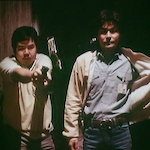 Ronny Yu is a director whose work I’ve enjoyed since the ‘90s, when I first saw his beautiful wuxia film THE BRIDE WITH WHITE HAIR. Part of what’s interesting about him is that he was so adept at making those lush martial arts fantasies, but he was on a trajectory to come to Hollywood and make something quite different, including two of the more notable and unusual franchise horror films of the late ‘90s and early 2000s.
Ronny Yu is a director whose work I’ve enjoyed since the ‘90s, when I first saw his beautiful wuxia film THE BRIDE WITH WHITE HAIR. Part of what’s interesting about him is that he was so adept at making those lush martial arts fantasies, but he was on a trajectory to come to Hollywood and make something quite different, including two of the more notable and unusual franchise horror films of the late ‘90s and early 2000s.
But he started out in another place entirely – making raw, low budget Hong Kong cop thrillers like his very-hard-to-find first two films, THE SERVANT (1979) and THE SAVIOUR (1980).
Yu was born in Hong Kong in 1950. He suffered from polio as a child, preventing the type of physical play most kids take for granted, and leading him to retreat into his imagination, especially by watching movies. “In the dark I could forget about my problems. I could forget that I couldn’t walk so good,” he later said. He attended a boys school in England, and in the ’70s he wanted to go to UCLA and study filmmaking. His dad wouldn’t pay for that, and told him that to really understand the United States he should live in the heartland. So – figuring commercials were similar to movies – Yu studied marketing and communication at Ohio University in Athens, Ohio, the alma mater of Paul Newman and Richard Dean Anderson. Other filmmaker alumni include Joe Eszterhas and Betty Thomas.
Becoming a director was kind of an accident, and it came, strangely, from being friends with a cop. Philip Chan had been a police officer for around 15 years before working as a consultant (and ultimately co-writer) on JUMPING ASH (1976) gave him the bug to be a movie star. He got a few bit parts, but his dream was to be a leading man in a movie about his experiences as a Superintendent in the Anti-Triad Squad of the Royal Hong Kong Police Force. No one was giving him that role, so he had to create it.
According to a talk with Yu at the 2004 Brussels International Festival of Fantastic Film (transcribed by The Flashback Files), he spent his summer break of ’78 in Hong Kong shadowing Chan on the job.
“Philip took me along to these bad neighborhoods, with the hookers and the gambling. He would make arrests. I thought that was so interesting. When you are young, you want to be with the guy who has a gun, right? Well, I did. Everybody respects you if you have a gun. So that summer, Philip and I wrote a script together, a buddy cop movie, like LETHAL WEAPON.”
They found an investor, but their script wasn’t even properly formatted. Since the directors they brought it to didn’t take them seriously, the investor told them to just direct it themselves. Yu thought that was ridiculous, but thankfully they talked him into it, so Chan and Yu are credited as co-directors. As far as I can tell the film was never released in the U.S., and I was only able to get ahold of a version without subtitles, so my understanding of what’s going on is limited, but I’ll give it a shot.
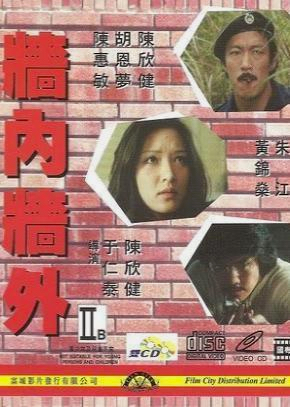
 THE SERVANT (originally Cheung nui cheung ngoi), is called THE SERVANTS on the credits of the version I saw, and that makes more sense. It stars Chan (later in HARD BOILED) as Inspector Pang, and Paul Chu Kong (later in THE KILLER and ONCE A THIEF) as Inspector Chow, two cops who get transferred to CID together. They’re introduced in the classic manner of the bloody shootout that turns out to be a drill with fake bullets. Chan is the guy who leads the daring raid, Chow is the guy who’s immediately shot while telling them over the bullhorn to come out. Their supervisor (who chews them out in English, so at least I understood this one part) says, “Mr. Chow, you’re very good in your written examination, but in field you’re lousy!” So I guess he’s got something to prove.
THE SERVANT (originally Cheung nui cheung ngoi), is called THE SERVANTS on the credits of the version I saw, and that makes more sense. It stars Chan (later in HARD BOILED) as Inspector Pang, and Paul Chu Kong (later in THE KILLER and ONCE A THIEF) as Inspector Chow, two cops who get transferred to CID together. They’re introduced in the classic manner of the bloody shootout that turns out to be a drill with fake bullets. Chan is the guy who leads the daring raid, Chow is the guy who’s immediately shot while telling them over the bullhorn to come out. Their supervisor (who chews them out in English, so at least I understood this one part) says, “Mr. Chow, you’re very good in your written examination, but in field you’re lousy!” So I guess he’s got something to prove.
According to the IMDb summary they’re trailing a gang who plan a jewel heist. If so, the plan seems to be masterminded by a guy still in prison, but I didn’t follow what was going on in those scenes. The important thing is that an inmate stabs a doctor in the head with a scalpel and there’s the first of many geysers of blood that will appear in the Yu filmography. (He often says he got that from samurai movies.)
Honestly I couldn’t follow the connection between various events. Michael Chan Wai-Man (ROYAL WARRIORS) plays a guy going around threatening people over I-don’t-know-what. He ambushes a guy at the docks, grabs him by the throat, smashes a tomato in his mouth, slashes his cheek, walks away eating a second tomato like it’s an apple. Another guy goes for a walk with a woman, hugs her in an alley, and slashes her on the back, somehow killing her?
As in any ’80s cop movie you have some random incidents unrelated to the plot for flavor. There’s an intense scene where Inspector Pang reports to a cluttered apartment where a mother threatens her kids with a hatchet while neighbors crowd in the hall to watch through the doorway. Pang fires a bullet into the floor to distract her, pulls her daughter out of her lap, then punches her. I wonder if this was one of the things Chan took from his actual career? Either way it’s a sample of the kind of craziness his job entails.
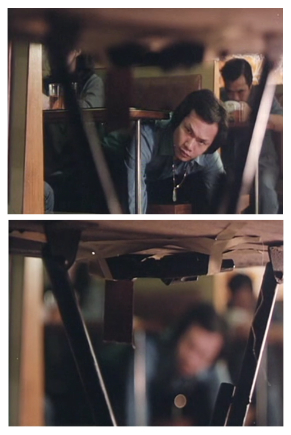 We see some guys meeting clandestinely, making plans, testing bombs. Pang and Chow identify suspects and stake them out. This leads to a tense scene where Pang pretends to work at a cafe where the criminals are meeting, while Chow listens from across the street. One of the suspects leans down to tie his shoe and notices the mic or recorder or whatever taped under a table. It’s communicated with a cool rack focus that’s pretty advanced for these directors who didn’t think they knew how to direct.
We see some guys meeting clandestinely, making plans, testing bombs. Pang and Chow identify suspects and stake them out. This leads to a tense scene where Pang pretends to work at a cafe where the criminals are meeting, while Chow listens from across the street. One of the suspects leans down to tie his shoe and notices the mic or recorder or whatever taped under a table. It’s communicated with a cool rack focus that’s pretty advanced for these directors who didn’t think they knew how to direct.
Chow knows shit is about to go south and runs over there, yelling at some kids to get away from the front of the cafe. Sure enough there’s a shootout. A guy gets his and flies through the glass door. I like that when it’s over they sit on the floor and catch their breath for a bit. They’re more contemplative than amped up. There are shots of each of the bloody, motionless bodies left on the ground to emphasize the horror of what went on.
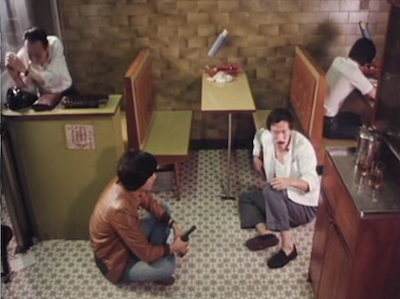
I can’t decipher anything about a jewel heist, but I know these guys know Chan and Pang are onto them and try to take them out. As they prepare it’s that familiar roommate experience: you’re sharpening your knife in the bathroom while that other nerd is wiring bombs shirtless in the living room:
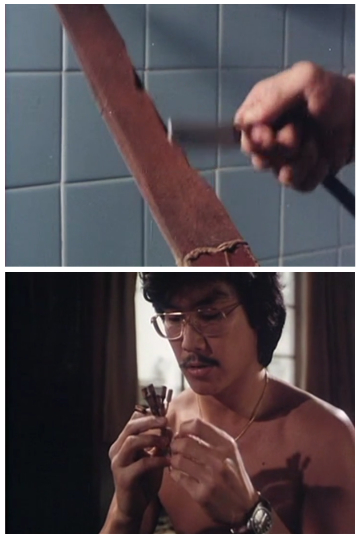
The bombmaker manages to sneak into Chow’s place and attach an explosive to his electric train set. Yu and Chan wring some good suspense out of the train repeatedly running but turning off or derailing before triggering the bomb. When it does go off it gets Chow’s mom and daughter, I believe? It’s quite an explosion and then we see police carrying bloody sheets that imply they were more like piles than bodies.
But there’s still time for dating. Yu does his first romance montage with a ballad and lots of dissolves and stuff. Walking around, slow dancing, roasting marshmallows on the beach. But there’s also lots of murders, and it all culminates in a nasty alley fight where Pang and his opponent manage to find a surprising number of weapons. He stabs the guy with a bamboo pole and a broken fluorescent light bulb.
Yu says the investor didn’t mind having rookie directors because the budget was so low, but man, there’s so much production value compared to what we consider a low budget today. There are scenes in a casino, a church, a disco (where one of the songs has a chant of “I’m mad as hell / I ain’t gonna take it no more”), there are crowd scenes on major streets, a scene with a boat, a prison riot with a bunch of guards with batons and shields beating inmates. The stunts are small scale – fist fights, knives and guns, no cars flipping or anything – but I like that. Makes it intimate.
And it gets some legitimacy from the synth score by the great Joseph Koo (WAY OF THE DRAGON, A BETTER TOMORROW). I think I noticed some borrowed Tangerine Dream in there too.
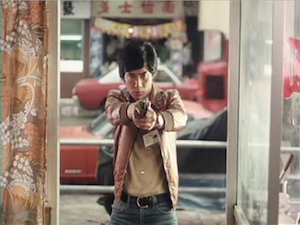 THE SERVANT was an immediate hit, which seems to bewilder Yu. He credits a helpful cameraman (maybe cinematographer Henry Chan, THE MASTER?) and editor (Wong Yee-Shun, THE STUNT WOMAN) with teaching him what to do. In retrospect, he believes that his ignorance of film grammar combined with his desire for it “to move, move, move” led to an energetic style that helped make the movie catch on. (It reminds me of Robert Rodriguez finding his editing style on EL MARIACHI because he recorded the sound on separate cassettes and needed to cut fast before it got out of synch.)
THE SERVANT was an immediate hit, which seems to bewilder Yu. He credits a helpful cameraman (maybe cinematographer Henry Chan, THE MASTER?) and editor (Wong Yee-Shun, THE STUNT WOMAN) with teaching him what to do. In retrospect, he believes that his ignorance of film grammar combined with his desire for it “to move, move, move” led to an energetic style that helped make the movie catch on. (It reminds me of Robert Rodriguez finding his editing style on EL MARIACHI because he recorded the sound on separate cassettes and needed to cut fast before it got out of synch.)
All the sudden he was a director, so he went right into his next film, and first solo directing effort, THE SAVIOUR. This is another one I had a hard time tracking down, but I did manage to see it with subtitles.
Yu already seems more confident and adventurous in his visual storytelling. He introduces his hero with an energetic montage quick-cutting through closeups. A clock hits 7:00 am and its alarm goes off. An eye opens, he swings out of bed, his feet reach for the floor, a barbell nearby. He cracks a toe, shadowboxes. News plays on the radio, next to a Coke can, an empty glass, sunglasses, an ashtray, an ID, a watch, a pager, a pack of Marlboros, a lighter. He takes a piss. Zips his zipper, buckles his belt. He picks up a gun – from under his pillow? Checks that it’s loaded. Spins it, flips it backwards into a holster like a cowboy, picks up the pager, watch, ID, cigarettes and lighter. He puts on a brown corduroy jacket, and we finally see his face as he puts a cigarette in his mouth and lights it. He straightens his collar and leaves his apartment.
Now more closeups: the key in the ignition. His hand pushing a white cassette into the tape deck. A funky disco-y prog rock jam plays as his car emerges from the parking garage and he heads to work. We’re 80 seconds in.
He’s Inspector Tom (Pai Ying, A TOUCH OF ZEN, ROYAL WARRIORS), one of those wildman cops who’s a pain in the ass to the boss but a legend on the force. We know that from the brief shootout and foot chase against two guys wearing motorcycle helmets. First guy gets a bloody hole through the helmet. Second guy runs, knocks over a kid on a tricycle, makes him cry. Tom stops to check on the kid, then shoots the runner, makes him fall off a building, his neck catching on a wire, hanging him in front of a comically scared man’s window. Cut to the chief chewing him out.
“If a person dies it’s fate” is his defense. Kind of the Ivan Drago philosophy.
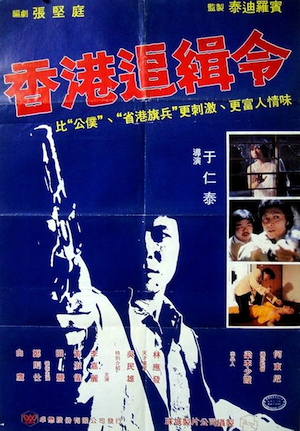 As one would expect in a cop movie, the boss assigns him a new partner, Chang Siu Cheung, a.k.a. Nineteen (Kent Cheng, ONCE UPON A TIME IN CHINA, WONDER SEVEN, AH KAM, FLASH POINT, IP MAN 2, 3 and 4), to investigate a series of murders of prostitutes. Tom tells Nineteen he’s had five partners, four are dead, the other is paralyzed. But they quickly get along well.
As one would expect in a cop movie, the boss assigns him a new partner, Chang Siu Cheung, a.k.a. Nineteen (Kent Cheng, ONCE UPON A TIME IN CHINA, WONDER SEVEN, AH KAM, FLASH POINT, IP MAN 2, 3 and 4), to investigate a series of murders of prostitutes. Tom tells Nineteen he’s had five partners, four are dead, the other is paralyzed. But they quickly get along well.
Tom isn’t married or dating but he has one person in his life: there’s a little kid at an orphanage named Shui Man (Lam Ying-Fat, THE STORY OF WOO VIET) who he visits once a week, gives him crayons, takes him for ice cream cones or to the beach. The subtitles call him the kid’s “foster father,” which I suspect is more like what we call a “big brother” here. From a later conversation it sounds like his rationale for not adopting him is that he’d be working all the time so he’d need a wife to have a kid but he can’t have a wife because who’d want to end up a widow? (In reality most cops don’t get killed, but I can understand the fear, and this guy does seem to be in more danger than most.)
When another prostitute is murdered, the boss is mad at Inspector Tom for not having already solved it, as is Miss Leung (Gigi Wong, THE BRAVE ARCHER AND HIS MATE) a friend of one of the victims who comes in to yell at him. He calms her down by giving her his card, and then they start hanging out. Nineteen wonders if she’s a prostitute herself, and Tom is enlightened enough to say, “I don’t care what she does as long as it doesn’t harm other people.” (But she’s “PR manager for the Night Club.”)
The identity and motive of the killer aren’t a mystery for long – there’s this pretty boy named Paul Kwok (Ng Man-Hung I believe?) who’s the “son of a tycoon” (and possible drug runner) named Kwok Sing Fung (Tien Feng, FIST OF FURY, A BETTER TOMORROW). Paul has a flashback about seeing his dad with a prostitute when he was a little boy. His mom pulls him away, says some weird stuff in front of a Virgin Mary statue, then slits her throat in front of him, her last words being “You remember, those tramps killed your mummy.” So as an adult he nervously sets up dates with various escorts, freaks out when he sees them nude and kills them.
It’s quite a blunt portrait of misogyny and double standards that Paul still blames the prostitute – or all prostitutes – and not his dad who hired them. When a survivor recognizes Paul from a photo in a newspaper Tom and Nineteen look into their background to make sure of what they’re getting into, and Nineteen notes about Senior that “early in his marriage he was a bit of a lad.” The man gets to be a bit of a lad and the woman has to die.
It’s kind of a thrill when they come to the Kwok mansion, stand up to Kwok’s “do you know who I am?” bullshit and arrest Paul. When they leave, Dad fumes by throwing something at a photo of his late wife. The photo and a crucifix fall off the wall, and he gasps when he finds a knife hidden in the crucifix, and realizes his son really did it. But then he says, “They are all dead and you want to bother my son?” He later lets his son know he destroyed the evidence by saying, “That cross was bad Feng Shui, so I got rid of it.”
I’m not sure I followed this bit with another killer. We see him get on an elevator with a woman, put a plastic bag over her head and stab her with an icepick. I figured he was a hitman Kwok hired while his son was being held so it would seem like he wasn’t the killer, and that’s still my theory, but it’s not really clear in this translation. At any rate, Yu wrings suspense out of the same guy getting on an elevator with Tom. He gets off before Tom but then ambushes him with a board at his door. Should’ve brought more than a board. That was an odd tangent.
They can’t hold Paul, and they need more evidence, so Tom gets Miss Leung to go undercover. She makes an excuse to talk to him by crashing into him at the grocery store, breaking a bottle of medicated dog shampoo he’s holding. She gets him to go out with her and though he immediately throws a tantrum and storms out when she’s asking too many questions, he apologizes. She seems to actually like him and doesn’t believe he’s the killer.
He comes to her apartment with a cake on her birthday. While he’s sitting in her living room he finds a porno mag and a wooden novelty toy that pops a spring-loaded boner when you open it, and he starts freaking out. Maybe she’s testing him, but I think she doesn’t catch on to what a weirdo he is when she says he can have the boner thing if he wants. She goes into the kitchen and tells him to get a knife out of the drawer and cut the cake. Yu does that old trick where we see Paul stabbing her repeatedly but it turns out to be his fantasy, and he leaves. Phew. I was gonna be pretty mad at Tom for getting Miss Leung killed. (He turns out to be in the other room watching.)
But Paul inevitably does turn on her, luring her to an abandoned building and holding her at gunpoint on the roof when the police catch up to him. The grimly satisfying ending is that “do you know who I am!?” Mr. Kwok shows up and tries to throw his weight around, runs past the police and when he bursts through the door to the roof his own son expects a cop and shoots him. Then while he’s in shock about having done that, Inspector Tom emerges and shoots him dead.
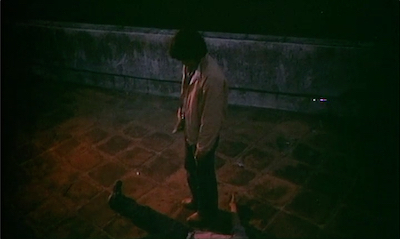 Leung’s not happy about that, though, and runs away. Tom droops over and sighs like he knows he fucked up. Look at that screengrab – he doesn’t look like the knight who slayed the dragon, he looks like motherfuckin Charlie Brown. It’s one of those nice melancholy endings. He goes to see Shui Man and finds out the kid’s been adopted. Good for the kid, bad for Tom. But the kid left a nice crayon drawing for foster-father. That’s sweet. A ballad starts up and Tom gets into his badass car and drives away, alone again.
Leung’s not happy about that, though, and runs away. Tom droops over and sighs like he knows he fucked up. Look at that screengrab – he doesn’t look like the knight who slayed the dragon, he looks like motherfuckin Charlie Brown. It’s one of those nice melancholy endings. He goes to see Shui Man and finds out the kid’s been adopted. Good for the kid, bad for Tom. But the kid left a nice crayon drawing for foster-father. That’s sweet. A ballad starts up and Tom gets into his badass car and drives away, alone again.
THE SAVIOUR isn’t really a stand out of the Hong Kong New Wave but I’ve watched it three times for writing this review and I think it’s a really solid one. A big part of that is that it’s a brisk 81 minutes, so everything moves at a clip, including cornier bits with the kid or a montage with Miss Leung and Paul as if they’re in love. Another big part is that Shaw Brothers regular Pai Ying just has such a cool screen presence, definitely reminiscent of Chow Yun Fat. Or I guess predicting Chow Yun Fat, since he hadn’t broken through yet. I like how the movie transitions from DIRTY-HARRY-type cop movie to more of a serial killer thriller, feeling like straight up horror during some of the attacks, and with a backstory flashback reminiscent of some of the seedier slasher movies.
But you still get some of that fun action movie shit, like of course some dumb motherfuckers try to rob a restaurant while Tom and Nineteen are eating there. Nineteen puts a gun on one guy’s dick and Tom pistol whips the other guy. Good for them not killing anybody. (They do lots of inexcusable cop shit though – putting a gun in a guy’s mouth, holding a lighter to Paul’s eye while interrogating him.)
There’s also just little bits of personality and oddness. I don’t know the meaning of Nineteen’s encounter with a TV crew trying to film an emotional scene while Nineteen is chasing down the killer, but it adds flavor. I like the part where some hipster tries to get Miss Leung’s number and she dumps ice down his shirt. On a totally different note, I like the whole encounter with the intended victim who gets away. She offers him a drink, then realizes she’s out and offers him a Vitasoy. When he attacks her she escapes into the bathroom and he repeatedly stabs at the door, but it doesn’t go through. She spooks him by throwing her bathroom scale through the window. All the details are so odd, it gives it an authenticity.
And the bits of music are good. I respect that 1980 was still more ’70s than ‘80s. There’s even a part where he goes into a pool hall and “Bad Girls” by Donna Summer is playing on the jukebox.
The filmatism isn’t too fancy, but there are some injections of style to it: the camera spinning around Tom and Leung having drinks, POV shots as he busts into apartments, or tracking the killer walking his dog as Tom drives past him slowly, a nice magic hour scene…
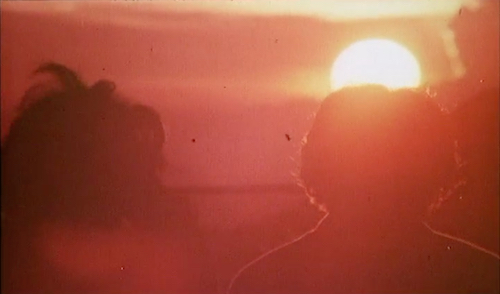
And the most showy one is definitely the split diopter shot of not-yet-a-suspect Paul eavesdropping on Tom and Nineteen’s conversation about their investigation.
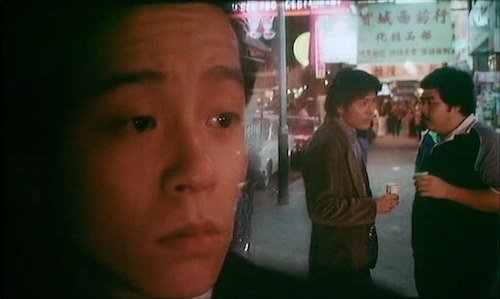
The cinematographer is Tony Hope (THE SPOOKY BUNCH).
This is the first film for screenwriter Alfred Cheung, who went on to be a prolific writer, actor and director. He wrote Sammo Hung’s THE MILLIONAIRES’ EXPRESS and Jackie’s THE MEDALLION. But he and Yu never worked together again other than Yu producing a 1992 movie that Cheung acted in.
* * *
Considering what a hard time I had finding THE SERVANT and THE SAVIOR, it would likely be difficult for you to follow along with these reviews at home. But that won’t always be the case in the journey we’re about to take.
You see, at least five years ago (I’m not sure when it was exactly) I made it a project to write a film-by-film analysis of Yu’s work. I love so many of his movies, and find him really interesting, in part because he bridges two of my biggest cinematic loves: Hong Kong martial arts cinema and American slasher sequels. I started with the primary question How does the guy who made THE BRIDE WITH WHITE HAIR end up being the guy who made FREDDY VS. JASON? But also, why does a director fascinating enough to have made that transition seem to have been mostly forgotten? I know it’s partly a matter of time passing and young people being interested in different things, but I think a lack of access to many Hong Kong films in modern formats has also kept them out of the conversation. There’s not much I can do about access, but I can start conversations. I think these are exciting films worth remembering and re-discovering, so that’s what we’re going to try to do.
When I started writing this series it was impossible to get a decent transfer of most of them. Even THE BRIDE WITH WHITE HAIR hadn’t been released here since the days of Tai Seng DVDs. That one, at least, has since come to remastered blu-ray overseas and, to my surprise, streaming here on the ad-supported streaming service Midnight Pulp. Initially I wrote that “this will not be the complete films of Ronny Yu, but as close to it as I can manage,” because there were several that evaded me. But since I’ve been writing these things for so long I kept looking, found some on import blu-ray and even a VCD, and I saw these first two thanks to the kind help of Matthew Essary and Mark Steiner, so my checklist is complete. We’re gonna do this.
 Please join me for the next couple months in a review series I’m calling UNCLE SAM WANTS YU. Together we will glide alongside the great Ronny Yu as he soars to the heights of Hong Kong cinema and then takes an unpredictable path in the great 1990s migration of Hong Kong directors to Hollywood. Though his output is wildly varied and he claims not to be an auteur, he has a distinct visual style and many thematic and autobiographical obsessions that connect his body of work. We’ll celebrate some beautiful movies, some bizarre ones, some obscure ones, some that have talking kangaroos in them. We’ll have fun, we’ll be inspired, we might even learn some things about the world.
Please join me for the next couple months in a review series I’m calling UNCLE SAM WANTS YU. Together we will glide alongside the great Ronny Yu as he soars to the heights of Hong Kong cinema and then takes an unpredictable path in the great 1990s migration of Hong Kong directors to Hollywood. Though his output is wildly varied and he claims not to be an auteur, he has a distinct visual style and many thematic and autobiographical obsessions that connect his body of work. We’ll celebrate some beautiful movies, some bizarre ones, some obscure ones, some that have talking kangaroos in them. We’ll have fun, we’ll be inspired, we might even learn some things about the world.
Tomorrow: Chow Yun Fat stars in THE POSTMAN STRIKES BACK (1982)
The post The Servants / The Saviour first appeared on VERN'S REVIEWS on the FILMS of CINEMA.

